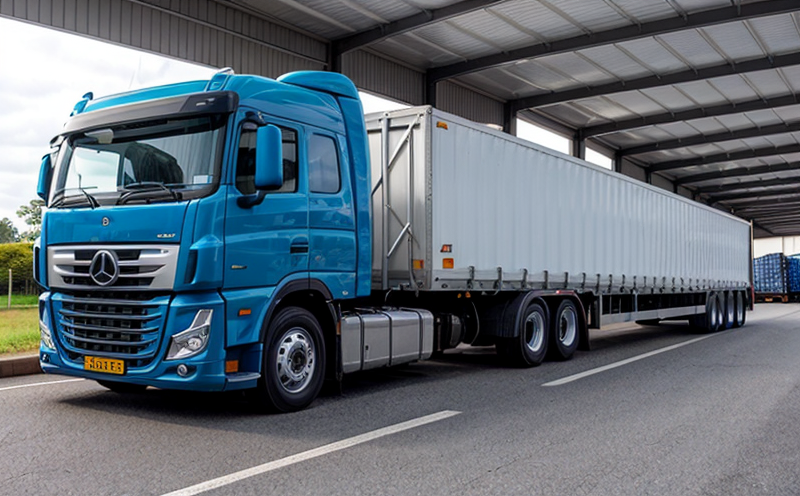ISO 8178 Engine Exhaust Emission Testing of Transport Goods
The ISO 8178 standard is a critical component in ensuring the environmental compliance and safety of transport goods. This international standard specifies methods for determining the exhaust emission characteristics of internal combustion engines used in various types of transport vehicles, including trucks, buses, and motorcycles. The test procedures outlined in this standard are designed to assess both hydrocarbon (HC) and carbon monoxide (CO) emissions, as well as oxides of nitrogen (NOx), which contribute significantly to air pollution.
The testing process involves a series of rigorous steps that ensure the accuracy and reliability of the emission data. The specimen preparation begins with the selection of representative transport goods for testing. These vehicles are typically selected based on their typical operating conditions, such as load capacity, engine size, and usage patterns. Once selected, these vehicles undergo a thorough inspection to ensure they meet all pre-test requirements.
The actual testing process involves placing the vehicle in a controlled environment chamber where it operates under specified test conditions that simulate real-world driving scenarios. The instrumentation used for this purpose includes advanced gas analyzers capable of detecting minute quantities of exhaust gases with high precision. The data collected during these tests are then analyzed and compared against established emission limits as defined by ISO 8178.
The results obtained from the testing process play a crucial role in ensuring that transport goods comply with local and international environmental regulations. By adhering to these standards, manufacturers can reduce their environmental impact while also meeting consumer expectations for cleaner transportation options. The data generated through this process is not only valuable for compliance purposes but also provides insights into potential areas of improvement within the design and manufacturing processes.
It's important to note that ISO 8178 testing is just one aspect of a broader approach to environmental sustainability in the automotive industry. Other factors, such as fuel efficiency improvements and advancements in alternative fuels, also contribute significantly to reducing emissions from transport goods. However, accurate emission testing remains essential for verifying compliance with regulatory requirements.
At Eurolab, we pride ourselves on providing comprehensive ISO 8178 engine exhaust emission testing services tailored specifically to the needs of our clients within the government and trade facilitation sector. Our state-of-the-art facilities are equipped with all necessary equipment and personnel trained to conduct these tests according to strict international standards.
Eurolab Advantages
At Eurolab, we understand the importance of accurate and reliable testing when it comes to meeting stringent regulatory requirements. Our ISO 8178 engine exhaust emission testing services offer several key advantages:
- Precision and Accuracy: Our advanced gas analyzers ensure precise measurement of emissions.
- Comprehensive Testing: We provide a full range of tests that cover all relevant parameters as specified by ISO 8178.
- Expert Personnel: Our team comprises highly qualified professionals who are experts in conducting these types of tests.
- State-of-the-Art Facilities: Equipped with the latest technology and equipment, our labs provide a controlled environment for accurate testing.
- Compliance Verification: Our services help ensure that your transport goods meet all relevant environmental regulations.
By leveraging these advantages, Eurolab enables you to confidently demonstrate compliance with international standards while contributing positively to global efforts towards cleaner transportation solutions.
Environmental and Sustainability Contributions
- Pollution Reduction: Accurate emission testing helps identify sources of pollution and enables targeted reductions.
- Regulatory Compliance: Ensuring compliance with environmental regulations fosters responsible business practices.
- Innovation Support: Reliable data from these tests can drive innovation towards more efficient engines and alternative fuels.
- Social Responsibility: By adhering to strict emission standards, companies demonstrate their commitment to public health and well-being.
These contributions are integral to our mission at Eurolab. We believe that through rigorous testing and continuous improvement, we can make a significant impact on the environmental footprint of the transport goods industry.
Use Cases and Application Examples
| Test Case | Description |
|---|---|
| New Vehicle Introduction: | Demonstrating compliance with emission limits before entering the market. |
| Aftermarket Parts: | Evaluating exhaust systems and components for aftermarket applications. |
| Research & Development: | Supporting innovation in engine technology through detailed emission analysis. |
| Compliance Audits: | Verifying ongoing adherence to environmental regulations post-production. |
The data generated from these tests can be used across various stages of the product lifecycle, ensuring that all aspects of transport goods are in line with current and future emission standards.





